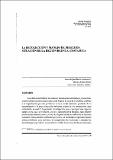| dc.contributor.author | Mora Camacho, Juan Rafael | |
| dc.contributor.author | Arauz Beita, Ileana | |
| dc.contributor.author | Jímenez Núñez, Geovanni | |
| dc.date.accessioned | 2020-09-22T06:46:22Z | |
| dc.date.available | 2020-09-22T06:46:22Z | |
| dc.date.issued | 1999 | |
| dc.identifier.issn | 1011-484x | |
| dc.identifier.uri | http://hdl.handle.net/11056/18219 | |
| dc.identifier.uri | https://www.revistas.una.ac.cr/index.php/geografica/article/view/1724 | |
| dc.description.abstract | Con el fin de identificar la situación actual acerca del manejo y tratamiento de los desechos en los municipios de la Región Brunca de Costa Rica y debido a la importancia que este problema tiene a escala nacional, producto de la inexperiencia y la poca educación existente acerca de los mecanismos para enfrentarlo, se realizó la presente investigación, que contempló una etapa de campo en la cual se visitaron los seis cantones de la Región, para obtener información administrativa y visitar los lugares donde actualmente se deposita la basura. Esto permitió confirmar que todos los municipios regionales tienen serios problemas para enfrentar el compromiso de recolectar y manejar los desechos que se producen en su cantón. La falta de censos y tarifas actualizadas limitan la posibilidad de planificar estrategias y tomar decisiones al respecto, y su antiguo modelo de recolección ha colapsado, por lo que las municipalidades requieren de capacitación y asesoría para enfrentar el problema | es_ES |
| dc.description.abstract | This study was carried out identify the current situation of garbage management and treatment in Costa Rica's southern Brunca Región, since this problem achieves national proportions resulting from lark of experience and education on the ways to face it. The study included field research in the six counties of the región to obtain information on the administration of the garbage and garbage disposal sites themselves. This enabled us to confirm that the region's municipalities (local governments) actually have serious problems in their commitment to pick up and manage garbage. The shortage of census and up-dated fares restrict their chances to plan strategies and make significant decisions. In addition, their obsolete garbage disposal systems have collapsed. Consequently, the municipalities require training and advising, together with funding, education, garbage sorting techniques and recycling methods for them to face the problem properly. | es_ES |
| dc.description.sponsorship | Universidad Nacional, Costa Rica | es_ES |
| dc.language.iso | spa | es_ES |
| dc.publisher | Editorial Universidad Nacional | es_ES |
| dc.rights | Acceso abierto | es_ES |
| dc.rights | Atribución-NoComercial-CompartirIgual 4.0 Internacional | * |
| dc.rights.uri | http://creativecommons.org/licenses/by-nc-sa/4.0/ | * |
| dc.source | Revista Geográfica De América Central vol.1 no.37 9-23 1999 | es_ES |
| dc.subject | IMPACTO AMBIENTAL | es_ES |
| dc.subject | PROTECCION AMBIENTAL | es_ES |
| dc.subject | REGION BRUNCA (COSTA RICA) | es_ES |
| dc.subject | TRATAMIENTO DE RESIDUOS | es_ES |
| dc.subject | ENVIRONMENTAL IMPACT | es_ES |
| dc.subject | ENVIRONMENTAL PROTECTION | es_ES |
| dc.subject | WASTE TREATMENT | es_ES |
| dc.title | La recolección y manejo de desechos: situación de la Región Brunca, Costa Rica | es_ES |
| dc.type | http://purl.org/coar/resource_type/c_6501 | es_ES |
| dc.description.procedence | Sede Regional Brunca, Campus Pérez Zeledón | es_ES |


